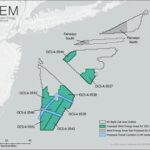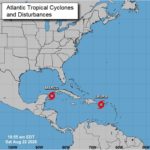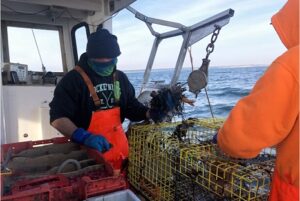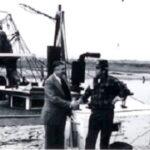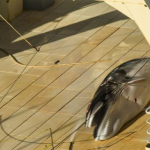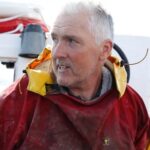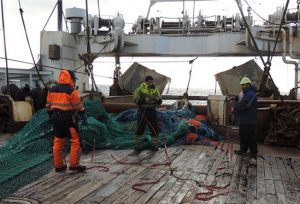Daily Archives: December 16, 2013
US AquaBounty genetically-modified salmon eggs approved for commercial exports by Environment Canada – Lack of egg export limit puzzles scientists
 Dylan Fraser and David Meerburg are independent scientists who were part of a 23-member panel that reviewed a risk assessment document from the Department of Fisheries and Oceans. AquaBounty is producing eggs in Bay Fortune, P.E.I. for salmon that are genetically-modified to grow twice as fast as regular salmon.The eggs are exported to Panama to be grown into full-size fish. The American company has applied to the U.S. FDA to be allowed to sell the fish as food in the U.S. AquaBounty applied to Environment Canada to export the eggs commercially if it gets that FDA approval. The P.E.I. plant has been operating as a research facility, but Environment Canada has approved it for commercial production. more@cbcnews 19:26
Dylan Fraser and David Meerburg are independent scientists who were part of a 23-member panel that reviewed a risk assessment document from the Department of Fisheries and Oceans. AquaBounty is producing eggs in Bay Fortune, P.E.I. for salmon that are genetically-modified to grow twice as fast as regular salmon.The eggs are exported to Panama to be grown into full-size fish. The American company has applied to the U.S. FDA to be allowed to sell the fish as food in the U.S. AquaBounty applied to Environment Canada to export the eggs commercially if it gets that FDA approval. The P.E.I. plant has been operating as a research facility, but Environment Canada has approved it for commercial production. more@cbcnews 19:26
Another ENGO Lawsuit filed against NMFS. Why don’t they sue the Navy?
 HONOLULU— A lawsuit filed in Hawaii federal court today challenges the National Marine Fisheries Service’s approval of a five-year plan by the U.S. Navy for testing and training activities off Hawaii and Southern California. [email protected] 17:47
HONOLULU— A lawsuit filed in Hawaii federal court today challenges the National Marine Fisheries Service’s approval of a five-year plan by the U.S. Navy for testing and training activities off Hawaii and Southern California. [email protected] 17:47
Opinion: NMFS Rule Recognizes that Fish Need Habitat, and if they don’t we’ll sue the sh!t out of ’em!
 Today, the National Marine Fisheries Service (NMFS) issued the final regulation regarding commercial fishing access to the longstanding protected habitat areas in the Gulf of Maine, southern New England, and Georges Bank. In May of this year, Conservation Law Foundation (CLF) sued NMFS over a related proposal to allow new fishing in over 5000 square miles of protected ocean habitat areas in New England. CLF brought the lawsuit due to a strong concern more@talkingfish 17:23
Today, the National Marine Fisheries Service (NMFS) issued the final regulation regarding commercial fishing access to the longstanding protected habitat areas in the Gulf of Maine, southern New England, and Georges Bank. In May of this year, Conservation Law Foundation (CLF) sued NMFS over a related proposal to allow new fishing in over 5000 square miles of protected ocean habitat areas in New England. CLF brought the lawsuit due to a strong concern more@talkingfish 17:23
Habitat debate intensifies ahead of NEFMC vote; Many ask, “Do closures even work?”
 WASHINGTON (Saving Seafood) — December 16, 2013 — Georges Bank is home to some of the most important fishing grounds in New England. But large portions of it have been off-limits to commercial groundfishermen and scallopers for almost twenty years, with a network of closed areas in place intended to restore habitat and assist in the rebuilding of fish populations. Now that network is up for revision with the Omnibus Habitat Amendment, which is currently being considered by the New England Fishery Management Council (NEFMC). The Amendment process has sparked a debate among fishermen, scientists, and environmental groups over these areas’ future. Questions have been raised over whether they are best left closed to facilitate conservation, or if the scallop and groundfish fleets should once again be allowed access to some of the most abundant fishery areas in the region. Added to that, is a discussion as to whether or not these closures have even benefited groundfish at all. more here 14:37
WASHINGTON (Saving Seafood) — December 16, 2013 — Georges Bank is home to some of the most important fishing grounds in New England. But large portions of it have been off-limits to commercial groundfishermen and scallopers for almost twenty years, with a network of closed areas in place intended to restore habitat and assist in the rebuilding of fish populations. Now that network is up for revision with the Omnibus Habitat Amendment, which is currently being considered by the New England Fishery Management Council (NEFMC). The Amendment process has sparked a debate among fishermen, scientists, and environmental groups over these areas’ future. Questions have been raised over whether they are best left closed to facilitate conservation, or if the scallop and groundfish fleets should once again be allowed access to some of the most abundant fishery areas in the region. Added to that, is a discussion as to whether or not these closures have even benefited groundfish at all. more here 14:37
F/V Endorphin – “We were floating around for about 24 hours without the generator, without lights, no heat,” Fisherman Christopher Fallon
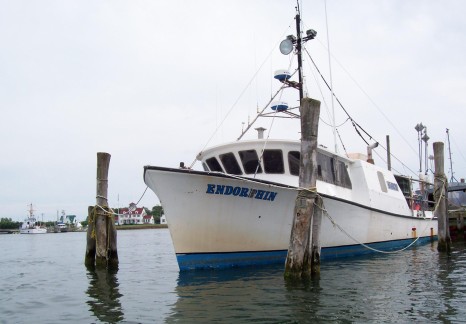 A commercial fishing vessel has been rescued by the Coast Guard and is safely back in Montauk, having survived rough weather and high seas after it went “adrift and without power” on Friday. After their 58-foot boat, the Endorphin, was moored about 9 Saturday night, three weary Montauk fishermen said they were ready for a hot shower and a glass of wine. Crew member Christopher Fallon, 26, said on Friday — which happened to be the 13th — after eight days at sea, the commercial fishing boat’s main engine started seizing up. The crew was headed back to port when the engine died and they lost their generator. more@newsday 11:40
A commercial fishing vessel has been rescued by the Coast Guard and is safely back in Montauk, having survived rough weather and high seas after it went “adrift and without power” on Friday. After their 58-foot boat, the Endorphin, was moored about 9 Saturday night, three weary Montauk fishermen said they were ready for a hot shower and a glass of wine. Crew member Christopher Fallon, 26, said on Friday — which happened to be the 13th — after eight days at sea, the commercial fishing boat’s main engine started seizing up. The crew was headed back to port when the engine died and they lost their generator. more@newsday 11:40
Distress call from the grounded F/V Nat, Coast Guard responds
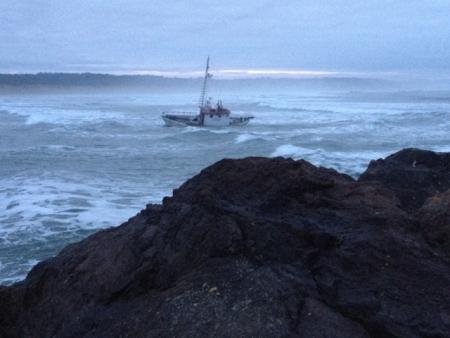 At approximately 3:30 p.m., Saturday, Coast Guard Sector North Bend, Ore., received a distress call from the fishing vessel Nat saying they were about to run aground on Yaquina Bay’s south jetty. The three crewmembers aboard the Nat swam to shore, where emergency medical services treated them for possible hypothermia. more@uscgnews 10:41
At approximately 3:30 p.m., Saturday, Coast Guard Sector North Bend, Ore., received a distress call from the fishing vessel Nat saying they were about to run aground on Yaquina Bay’s south jetty. The three crewmembers aboard the Nat swam to shore, where emergency medical services treated them for possible hypothermia. more@uscgnews 10:41
Fished out – Atlantic fishing nations fail to act to protect tuna and sharks.
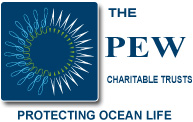 The ICCAT nations did maintain catch limits on Atlantic bluefin tuna. They also announced steps to force large fishing vessels to carry a unique identification number beginning in 2016, after many cases of illegal fishing off West Africa, with ships often changing names and flags in order to evade sanctions over illegal fishing. “Sharks is where they really dropped the ball,” said Elizabeth Wilson, director of the Pew Charitable Trusts’ international ocean policy unit, which had observer status at the gathering. “There was very little discussion about sharks. They barely even talked about it in their meetings, which is very disappointing,” she said in a phone interview after the meeting ended. more@thestar 10:22
The ICCAT nations did maintain catch limits on Atlantic bluefin tuna. They also announced steps to force large fishing vessels to carry a unique identification number beginning in 2016, after many cases of illegal fishing off West Africa, with ships often changing names and flags in order to evade sanctions over illegal fishing. “Sharks is where they really dropped the ball,” said Elizabeth Wilson, director of the Pew Charitable Trusts’ international ocean policy unit, which had observer status at the gathering. “There was very little discussion about sharks. They barely even talked about it in their meetings, which is very disappointing,” she said in a phone interview after the meeting ended. more@thestar 10:22
Oversight Hearing on: •”ESA Decisions by Closed-Door Settlement: Short-Changing Science, Transparency, Private Property, and State & Local Economies”
 Watch the archived video webcast – “Undoubtedly, some believe cramming hundreds of obscure species onto the ESA list under deadlines and blocking off huge swaths of land because of the settlements are ‘successes,’ but many areas of the country tell a different account of how these policies are impacting their communities, their economies, and ultimately, the species,” Doc Hastings [email protected] 09:08
Watch the archived video webcast – “Undoubtedly, some believe cramming hundreds of obscure species onto the ESA list under deadlines and blocking off huge swaths of land because of the settlements are ‘successes,’ but many areas of the country tell a different account of how these policies are impacting their communities, their economies, and ultimately, the species,” Doc Hastings [email protected] 09:08
Sam Novello urges eased whiting limits – Getting the bureaucracy run around
![]() Novello said he first approached National Oceanic and Atmospheric Agency staff with his idea and was told to bring his proposal to the NEFMC. ”I think they were giving me a bit of the runaround,” Novello said. He then contacted the Newburyport-based NEFMC and said he was told no changes could be made to the area’s fishing schedule until 2015 at the earliest. ”That’s it,” Novello said. “That’s all I got.” Not so, said Andrew Applegate, NEFMC’s small mesh multi-species plan coordinator. Applegate said he did not shut the door on Novello’s proposal, that he instead told the Gloucester fisherman that the process for changing the regulations is a lengthy one, involving the development of new rules, the submission of the rules for review and then the actual implementation by
Novello said he first approached National Oceanic and Atmospheric Agency staff with his idea and was told to bring his proposal to the NEFMC. ”I think they were giving me a bit of the runaround,” Novello said. He then contacted the Newburyport-based NEFMC and said he was told no changes could be made to the area’s fishing schedule until 2015 at the earliest. ”That’s it,” Novello said. “That’s all I got.” Not so, said Andrew Applegate, NEFMC’s small mesh multi-species plan coordinator. Applegate said he did not shut the door on Novello’s proposal, that he instead told the Gloucester fisherman that the process for changing the regulations is a lengthy one, involving the development of new rules, the submission of the rules for review and then the actual implementation by NOAA Fisheries NMFS. more@gdt 00:35



































